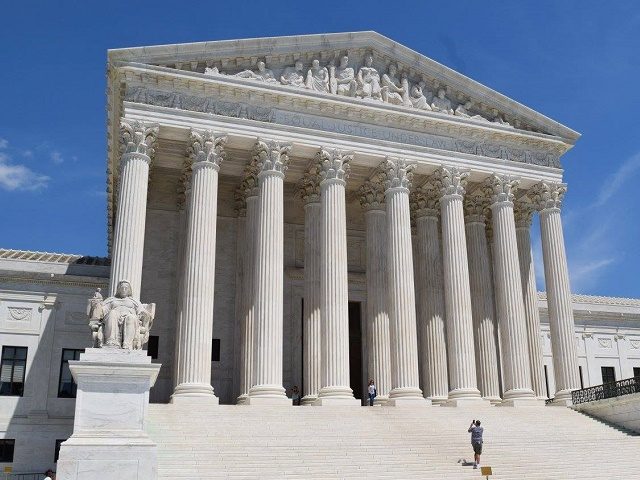The Supreme Court dealt a near-lethal blow on Wednesday to claims brought by shareholders of Fannie Mae and Freddie Mac who sought to overturn a 2012 agreement that has sent nearly all of the mortgage giant’s profits to the U.S. Treasury.
The court in Collins v. Yellin ruled that the Federal Housing Finance Agency was permitted by the 2008 Recovery Act to enter into the challenged 2012 agreement and that the anti-injunction clause of the 2008 Recovery Act forbids courts from restraining the agency when it acts as a conservator. So the profit arrangement known as the “net worth sweep” will be allowed to continue.
“It is not necessary for us to decide—and we do not decide—whether the FHFA made the best, or even a particularly good, business decision when it adopted the third amendment [that put in place the net worth sweep],” Justice Samuel Alito wrote in his opinion for the court. “Instead, we conclude only that under the terms of the Recovery Axct, the FHFA did not exceed its authority as conservator, and therefore the anti-injunction clause bars the shareholders’ statutory claims.”
The court also ruled that the provision of the Recovery Act that restricted a president’s ability to remove the FHFA’s director is unconstitutional. Where the statute said the director could only be removed “for cause,” the court on Wednesday said the director must be removable at the president’s discretion.
The court held that “the Constitution prohibits even ‘modest restrictions’ on the President’s power to remove the head of an agency with a single top officer.”
Yet the court declined to set aside the sweep of the profits of Fannie and Freddie on the grounds that the appointment of the director was constitutional even if the removal clause was not. The court ruled that the argument of shareholders that the 2012 agreement should be considered invalid on the basis of the unconstitutional removal clause is “neither logical nor supported by precedent.”
The ruling means that President Joe Biden could oust FHFA director Mark Calabria, who was appointed by President Trump for a term that expires in 2024.
Fannie and Freddie do not make home loans. They buy mortgages from banks, bundle these into securities to be sold to investors, and guarantee timely payments to buyers of the securities. This is intended to provide liquidity to the mortgage market and is thought to be central to the ability of lenders to offer fixed-rate, 30-year mortgages, a home loan product not offered in most markets outside the U.S.
For years, the two companies were immensely profitable because investors believed that they were implicitly backed by the U.S. government, making their mortgage guarantees as safe as sovereign debt. Some lawmakers and the companies themselves denied that there was any implicit backing but when the companies teetered on the verge of collapse in 2008, they were taken over by the FHFA and Treasury extended an unprecedented and—for a time—unlimited line of capital to the two companies. This allowed the two companies to make good on all the guarantees they had extended and to provide liquidity to the mortgage market even at the height of the financial crisis.
In exchange for the bailout, Treasury received warrants to buy nearly 80 percent of the common stock and a special class of stock that paid a 10 percent dividend. In addition, the companies agreed to pay a commitment fee on the ongoing backstop facility provided by the government.
The government would eventually pump $190 billion into the firms, nearly half of the $400 billion ongoing bailout facility. Some of these funds were actually used to pay the 10 percent dividend because the profits earned by the companies fell short of the required amount. The result was what became known as “a circular draw,” with the companies taking money from the Treasury that was used to pay the dividend to the Treasury.
This was not only silly, it was also potentially dangerous. The government’s authority to increase the amount of capital available to the companies had expired in 2009 and become fixed at $400 billion. Each new draw diminished the amount available. Officials in the Obama administration worried that at some point the market would become concerned that the two companies could fall into distress again.
To avoid this, the Treasury and the FHFA amended the agreement in 2012 to end the circular draws. Instead of a fixed 10 percent, the companies would pay a flexible dividend equal to their positive net worth less a small cushion. As a result, the companies are obligated to pay nearly all their profits to the Treasury. In lean quarters, the companies have paid less than they would have under the original arrangement. In profitable quarters, the companies paid more. All told, Fannie and Freddie have paid more than $300 billion to the government in dividends.
Shareholders brought numerous lawsuits objecting to what has become known as the “net worth sweep.” Most federal courts tossed the suits on the grounds that the sweep was authorized in the broad grant of powers Congress included in 2008’s Housing and Economic Recovery Act. After a Fifth Circuit appeals court did the same, a deeply divided en banc panel of the court ruled in favor of shareholders on some of their claims.
Wednesday’s decision represents a near total vindication for the government and a defeat for the hedge funds and other shareholders who have been battling the government over Fannie and Freddie’s profits for nearly eight years.
The decision did offer a sliver of hope to shareholders by leaving it to the lower courts to decide if they were harmed by the unconstitutional removal provision.
The cases are Collins v. Yellin, Nos. 19-563 in the Supreme Court of the United States.
Correction: An earlier version misstated the amount of dividends paid to the U.S. Treasury.
Follow John Carney (@carney) on Twitter.

COMMENTS
Please let us know if you're having issues with commenting.